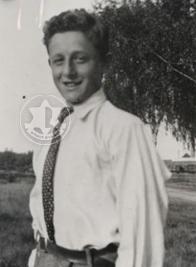Yehuda (Rudi) was the son of Yisrael and Anna (nee Raoch). He was born on the 21st of Tamuz, 5680 (תר"פ) (July 7.1920) in Cottbus, Germany. He was the oldest of three; his brother Harry was born in 1923 and his sister Edith was born in 1925.
From an early age, Rudi was a member of the “Bonim Youth Movement” in his city. ("The Builders”- “Bonim” in Hebrew was founded in 1929 in the United Kingdom and over a period of years, spread to all English-speaking countries. Each country developed its own independent version of the original movement, whilst sharing the core ideology of being a Jewish Socialist-Zionist cultural youth movement.) Rudi trained in a village in Germany for three years before he set out to Palestine.
After the rise of the Nazi Party and his father’s death, in September,1936, Rudi arrived in British Occupied Palestine aboard the “Patria” ship, together with a group of youth who were all within the Bonim youth movement. In the beginning, he remained on Kibbutz Tel Yosef for about two years. It was within that group that Rudi met his girlfriend, Techiya. In 1939, he was among the initial small group of people who planned to establish the new settlement of “Kedma” which eventually settled as an independent unit of the United Kibbutz Movement near Netanya. The original members established a varied agricultural farm and worked as hired help in the various settlements in the area. Rudi was in charge of matching people with available jobs. He also worked as the chief gardener in Netanya. Among his friends he was known as an introvert who often liked to isolate himself from the group but he was well-liked because he was committed to his work, dedicated to his job and to his friends. Aside from his persistence to improve his knowledge in many categories (agriculture, seamanship, and a better command of the Hebrew language), Rudi enlisted in the “Hagana” (Jewish underground in British Mandatory Palestine). He participated in raids on Arab gangs and completed courses in seamanship. Later on he served as an instructor of these very same courses, thereby maintaining his connection with the sea which he loved.
In May, 1941, he was called up to participate in a special operation known as “Operation Boatswain” commemorating the twenty three Hagana fighters that disappeared together with the British officer in charge by the name of Palmer on their way to sabotaging the refineries in Tripoly, Lebanon, on May 18, 1941 (21 of Iyar, 5701). In some circles, this operation is also referred to as the Twenty Four sailors who disappeared at sea so as to include Officer Palmer. The cause for the disappearance of the twenty-four and their boat was never resolved and their bodies were never found. Rudi was 21 when he lost his life.
Rudi’s mother, Anna, and his two siblings, Harry and Edith, were exiled back to Poland in October,1938 (with other Jews who had immigrated in the past to Germany), and in 1939 they were transferred to Lviv (today it is part of the Ukraine). The mother and her offspring were murdered during the Holocaust as were most of the mother’s family.
The details of Rudi Czerner’s life appear in part on the “Yizkor”site of the Ministry of Defense. In 2017 the twenty three Jewish members of the Hagana who fell in Operation Boatswain were recognized as British soldiers who had died in combat.
The particulars of Rudi’s life were researched and completed in 2017 by the volunteers of “Giving a Face to the Fallen”.
